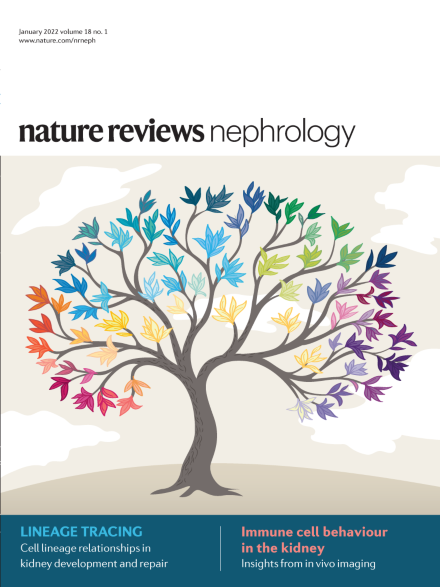老年人慢性肾病的治疗
IF 28.6
1区 医学
Q1 UROLOGY & NEPHROLOGY
引用次数: 0
摘要
随着世界人口的老龄化,预计老年人慢性肾脏病(CKD)患病率的增加将对医疗保健系统在疾病管理资源分配方面提出巨大挑战。老年慢性肾脏病患者的治疗策略最好与普通人群的治疗策略保持一致,重点是最大限度地减少心血管事件和降低发展为肾衰竭的风险。SGLT-2 抑制剂和 GLP-1 受体激动剂等新兴疗法有望有效治疗老年慢性肾功能衰竭。此外,营养和运动疗法等非药物干预措施也发挥着重要作用。这些干预措施可以增强药物治疗的效果,更重要的是,有助于维持认知功能和整体生活质量。在考虑对肾衰竭患者进行肾脏替代治疗时,除了年龄和认知功能外,还必须考虑其他各种因素。重要的是,所有治疗方案,包括透析、移植和保守治疗方法,都应通过以患者为中心的决策来因人而异。数字技术与医疗实践的动态整合有可能改变老龄人口的慢性肾脏病管理。本文章由计算机程序翻译,如有差异,请以英文原文为准。


Treatment of chronic kidney disease in older populations
As the world population ages, an expected increase in the prevalence of chronic kidney disease (CKD) among older individuals will pose a considerable challenge for health care systems in terms of resource allocation for disease management. Treatment strategies for older patients with CKD should ideally align with those applied to the general population, focusing on minimizing cardiovascular events and reducing the risk of progression to kidney failure. Emerging therapies, such as SGLT-2 inhibitors and GLP-1 receptor agonists, hold promise for the effective management of CKD in older individuals. In addition, non-pharmacological interventions such as nutritional and exercise therapies have a crucial role. These interventions enhance the effects of pharmacotherapy and, importantly, contribute to the maintenance of cognitive function and overall quality of life. Various factors beyond age and cognitive function must be taken into account when considering kidney replacement therapy for patients with kidney failure. Importantly, all treatment options, including dialysis, transplantation and conservative management approaches, should be tailored to the individual through patient-centred decision-making. The dynamic integration of digital technologies into medical practice has the potential to transform the management of CKD in the aging population. Aging of the global population is expected to increase the prevalence of chronic kidney disease. This Review describes approaches to the management of kidney disease in older populations, highlighting the need for a holistic approach aimed at meeting the treatment goals of the patient.
求助全文
通过发布文献求助,成功后即可免费获取论文全文。
去求助
来源期刊

Nature Reviews Nephrology
医学-泌尿学与肾脏学
CiteScore
39.00
自引率
1.20%
发文量
127
审稿时长
6-12 weeks
期刊介绍:
Nature Reviews Nephrology aims to be the premier source of reviews and commentaries for the scientific communities it serves.
It strives to publish authoritative, accessible articles.
Articles are enhanced with clearly understandable figures, tables, and other display items.
Nature Reviews Nephrology publishes Research Highlights, News & Views, Comments, Reviews, Perspectives, and Consensus Statements.
The content is relevant to nephrologists and basic science researchers.
The broad scope of the journal ensures that the work reaches the widest possible audience.
 求助内容:
求助内容: 应助结果提醒方式:
应助结果提醒方式:


